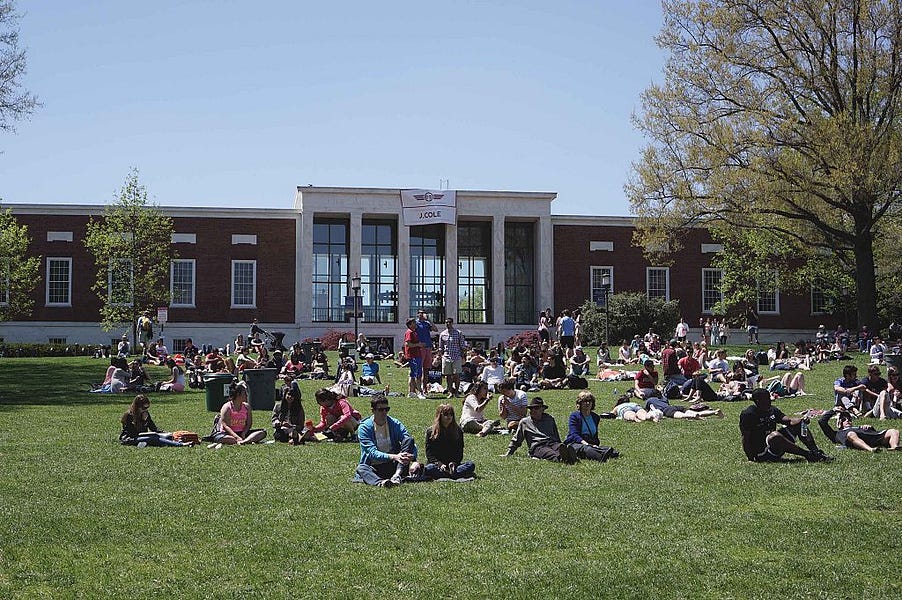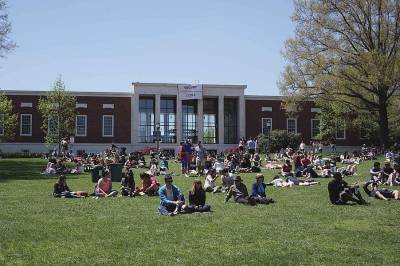Much has been written about the education divide in American politics: Those with college degrees tend to see the world in ways that those without do not. But I think there is more to the social effects of American higher education than simply whether or not one has a degree. The meaning of a college degree has changed over time in ways that may explain why our elites are consistently so much less than we hope for.
In 1940, just 4.6 percent of the U.S. population had a bachelor’s degree or higher, according to the U.S. Census Bureau. Today, the number is 37.5 percent. Politicians celebrate the growth of higher education as proof that we are smarter, more learned, and readier for the information economy than ever. But the content, rigor, and quality of that education has changed dramatically. Grade inflation, the disappearance of a meaningful core curriculum, and the rise of vocational training means that a bachelor’s degree does not mean what it used to mean. Having a college degree in 2021 is drastically different than having a college degree in 1921.
To get a college degree 100 years ago, students had to master Latin, Western history, rhetoric, English literature, higher mathematics, and a smattering of theology and philosophy. This was considered to be a classical liberal arts education. The point, ideally, was to immerse a student in a breadth and variety of subjects to encourage broad-mindedness, liberality, imagination, intellectual flexibility, and critical judgment. With roots as far back as ancient Greece, the liberal arts were believed to be essential for the growth of leaders, thinkers, and creators.
Today, students get almost none of that content. Student activists revolted against the classics in the 1960s, believing them to be irrelevant and racist. They demanded fundamental changes to make college curricula more relevant and representative—and they won. While broadening the canon held promise, reforms generally subtracted more than they added and threw the entire idea of a canon into question. Today students get, at most, a mere sampling of a classical liberal arts education. The most popular majors are business, health, engineering, medicine, computer science, communications and journalism, and (decreasingly) education. In other words, they are job training programs rather than courses of study in the liberal arts.
When conservatives complain about the state of higher education, they typically point the finger at the deterioration of the social sciences and humanities into critical theory, identity politics, and “grievance studies.” I sympathize with the complaint, but the number of students actually majoring in those areas is tiny compared to the army marching through business, communications, engineering, and medicine. The university is being taken over by future accountants and lawyers more than social justice warriors.
But don’t students get a classically liberal education in their core curriculum, before they specialize? Not according to the American Council of Trustees and Alumni, who did a survey of core requirements in 2010. They outlined seven areas that should comprise a broad core and graded colleges by how many subjects were covered. Sixty-two percent of colleges and universities received a C or lower. Colleges have hollowed out or, in some cases, like Brown University, eliminated core requirements altogether.
Over the same time period, grade inflation has undermined rigor. The most common grade given in most courses at most universities is an “A,” accounting for something like 45 percent of all grades given. The average GPA has risen nearly a half-point over four decades. Part of the problem is students who approach their education as consumers, treat professors as employees who owe them good marks, and complain about anything less. Another problem is the rise of student evaluations (also from the 1960s), which shifted the balance of power within universities.
Grade inflation is an obvious problem, but the loss of liberal education is a bit more complex. There is nothing wrong with vocational training—indeed, we probably need more, not less, of it. Epistemologically speaking, there is little difference between the plumber and the computer scientist except for the kind of pipes they build and maintain. Both are practical applications of techne, instrumental rationality, to problems in the world. And both are vital: I would be lost without either because I can fix my laptop when it crashes no better than I can repair burst pipes in my home.
But there is something wrong with packaging and selling vocational training as something it is not. It is false advertising—both to the students enrolled in the programs and to the society that supports the ongoing higher education enterprise. Society expects the university to produce leaders and thinkers; instead, we get technocrats and pundits. The students, for their part, may be guilty of cultivating an unearned confidence in their own thinking. Told that they have been trained in the broad liberal arts and that they are entering the intellectual elite when they have actually been given little more than vocational training, they think of themselves as opinion-shapers whose voice should carry weight.
The upshot is that instead of a broadly-educated citizenry trained in careful thinking, we have a class of vocationally trained workers with a sense of entitlement to be treated as an intellectual elite. In other words, our universities are amplifying the Dunning-Kruger Effect, the notion that people generally believe they are smarter than they are, that our confidence routinely outstrips our competence, and that people of low achievement have the highest confidence in themselves. College education has elevated Dunning-Kruger from a quirky finding about the low end of the achievement spectrum into a generalized description of American culture. It turns out none of us are terribly well-educated, and we are all more confident than our actual competence merits.
That may explain a lot about our information environment: why people argue on Facebook and Twitter with amazing levels of confidence, why culturally illiterate pundits get paid for shockingly shallow and ignorant talking points, why people with no expertise argue with trained professionals after reading one article on the internet. A third of Americans have just enough higher education to believe their opinions should carry authority with little of the wisdom, critical thinking, or humility that a real education is supposed to germinate.
Let me anticipate one criticism and one question. First, doesn’t this apply to me as well? Am I not one of the overly-confident Philistines I am describing here? Second, if this is true, what do we do about it? How can we climb our way out of this trap of ignorant confidence?
First, yes, I freely admit to my own Philistinism. After my sophomore year in college, when I had finished the core requirements, I was surprised and disappointed at how little I felt I knew. Here is what I tried to do about it: That summer I sat down and read just three books—but I read them carefully, cover-to-cover: the Bible, the Odyssey, and the Iliad. It was my effort to start learning what I had been waiting around for someone to teach me.
A decade later, as I was finishing my Ph.D., I did it again. I compiled a list of 100 great books and began to work my way through them. I haven’t yet made it through all 100 (I may still someday), but it was the first time I ever read Dostoevsky or Dickens, the Canterbury Tales or the Song of Roland. It was the most fun I ever had in my education and I felt later that it helped me not only as a writer and thinker, but as a person and a citizen. Even still, I think it is just the beginning of a real education.
Some universities have started to rediscover and redesign great books programs. Some think tanks, fellowships, and foundations have tried to fill in the gaps with extracurricular programs and weeklong seminars. These might create a few opportunities for genuine education for those willing and able to look hard for it.
Those programs aren’t for everyone. But another solution that is for everyone is for all of us to practice recognizing our own ignorance and to temper our conversation accordingly. We don’t all need to be trained in the classics or read ancient poetry, but we can all cultivate humility and grace in our conversations with each other. Yes, in a democracy we all count and every one of us has the right to have and express an opinion. But that does not mean an ignorant opinion has the right to make policy, or that expressing our opinion should trump human decency and mutual respect. Sometimes it is okay to say “I don’t know,” or to refrain from expressing—or even having—an opinion on something about which we know little.






Please note that we at The Dispatch hold ourselves, our work, and our commenters to a higher standard than other places on the internet. We welcome comments that foster genuine debate or discussion—including comments critical of us or our work—but responses that include ad hominem attacks on fellow Dispatch members or are intended to stoke fear and anger may be moderated.
With your membership, you only have the ability to comment on The Morning Dispatch articles. Consider upgrading to join the conversation everywhere.